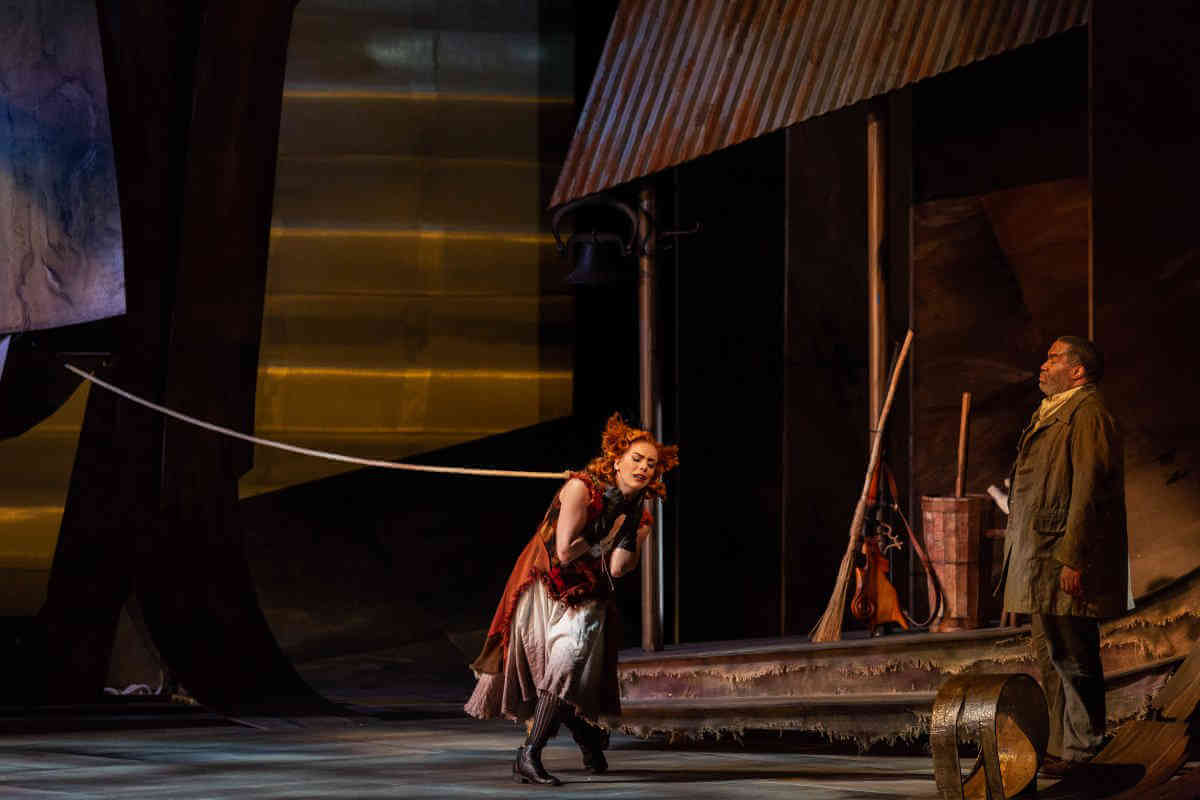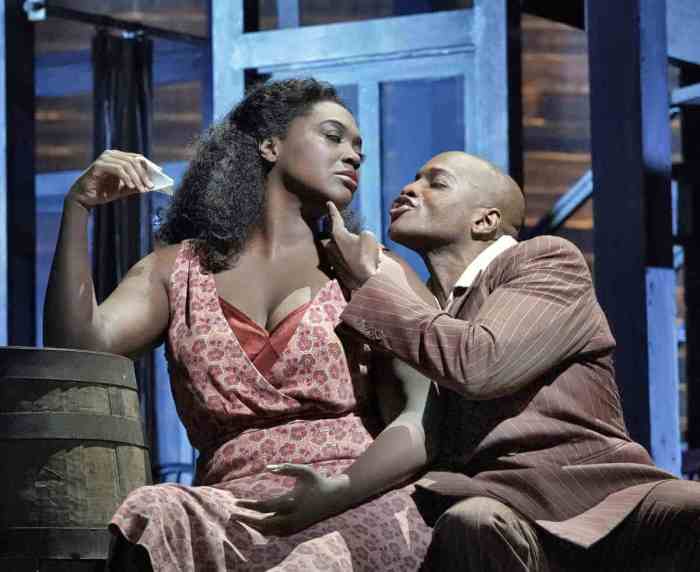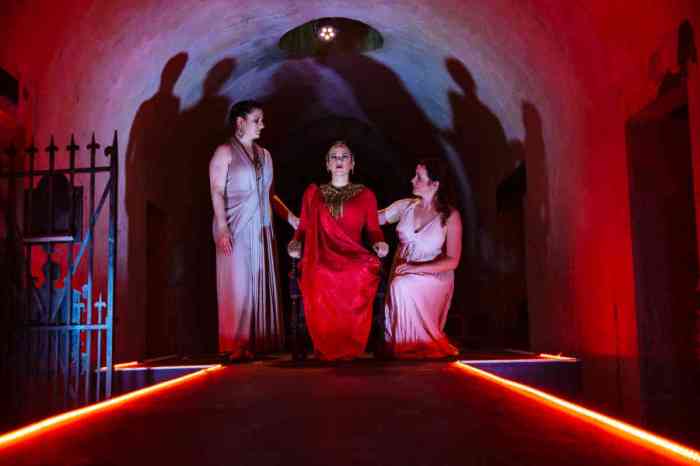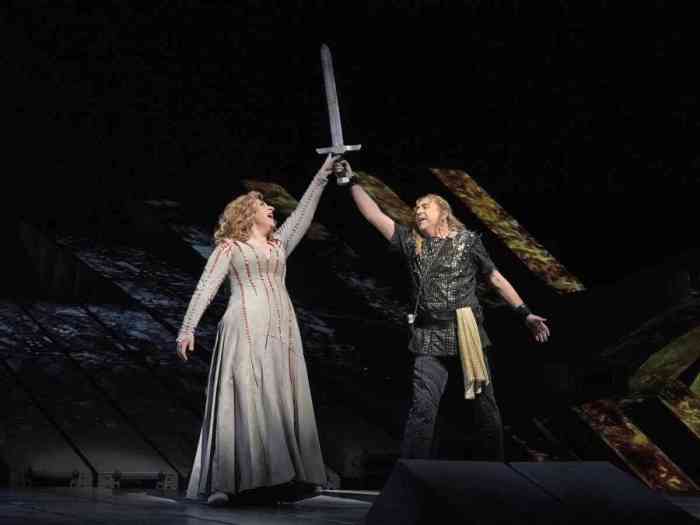Glimmerglass’s 2018 season continued with an inspiriting production of Leos Janacek’s 1924 “The Cunning Little Vixen,” surely the first opera based on a comic strip. Aged 69 at its Brno premiere, Janacek filled the piece with his feeling for nature and a mature appreciation of life’s inevitable cycles. It can tempt directors and designers into cutesiness, but E. Loren Meeker and set designer Ryan McGettigan crafted something organic-seeming, largely autumnal rather than vernal visually — and, in a sense, emotionally. Choreographer Eric Sean Fogel obtained extraordinarily detailed, diverting work from the cast, dressed and styled with spectacular imagination by Erik Teague and Dave Bova, respectively. I’ve sometime felt out of sorts with Kelley Rourke’s “Make’ em laff” Cooperstown translations, but here she caught exactly the right tone.
One frankly doesn’t visit Glimmerglass for the orchestra, but music director Joseph Colaneri led his forces with very solid results. If you’ve heard the Cleveland or Juilliard orchestras play “Vixen” — just two of the recent high-profile stagings that made the Newspaper of Record’s characterization of this highly sophisticated, multi-genre piece as “a rarely performed folk opera” so doubly baffling — some of the section playing in Cooperstown on August 10 sounded thin. But — as in the following afternoon’s “Barbiere di Siviglia” — ensembles held together swimmingly and solo instrumental work was cleanly stated.
Eric Owens — locally an artistic advisor — gave wonderful life and empathetic spirit to the Forester: a truly great performance, “starry” while always serving the ensemble and the work. The very top of Owens’ bass-baritone proved recalcitrant, but otherwise he sounded rich and resonant, his crystal-clear, highly expressive enunciation of the text furnishing a model to the entire company. The final scene moved me more than anything on this stage since — well — his 2012 rendition of Weill’s “Lost in the Stars.”
Remarkably, Young Artists took all the other roles — some of them doubled and trebled as usual. As Velma in “West Side Story,” soprano Joanna Latini had showed herself a very capable dancer. Her presence and physicality onstage here as the titular Vixen were quite amazing in range and effectiveness. She moved with grace and expressiveness and has a wonderful face for the stage. Her singing, full of spunk and feeling, was usually quite accomplished, showing a substantial lower register rare in this role. But occasionally she pushed or slid into top notes. The Vixen isn’t really a part for judging voices — there’s a lot of short-motived, conversational stuff and not much cantabile singing — but Latini certainly showed herself a committed, talented performer one looks forward to hearing in other assignments.
As the macho Fox with whom the Vixen produces a welter of cubs, high mezzo Alyssa Martin sang ardently with a pleasing throb of vibrato. Colaneri conducted their passionate duets very effectively; hearing the vocal blend and soaring lines made me wonder if Janacek had ever heard Massenet’s “Cendrillon.”
Solid bass Zachary Owen deftly created complete portraits in sound and movement of the Forester’s supercilious barmate the Parson and the irascible Badger whom the Vixen summarily evicts. Tenor Dylan Morrongiello drew elaborate portrayals of the Mosquito and the lonely Schoolmaster, showing career potential for English and American rep character roles — though his diction proved needlessly fussy. The bass portraying the poacher Harasta — who kills the Vixen in a terrifyingly sudden moment, here strikingly set-off in Mark McCullough’s evocative lighting plot — acted vividly but lacked the vocal chops for the role. Katherine Maysek shone briefly as the canine Lapak. Substantial-voiced mezzo Gretchen Krupp made Pasek’s Wife a moving three-dimensional cameo, also registering positively as a Woodpecker and the Head Hen.
Staging the Rossini, Francesca Zambello admirably used very little of the provincial shtick that usually encrusts this repertory staple comedy. She devised a lot of new shtick, though: she and costumer Lynly Saunders took the idea of “Barbiere” as commedia dell’arte and ran with it full-bore. Sure, Beaumarchais’ characters have some roots in commedia characters — Figaro’s a variant of Brighella, the crafty servant — but there’s also a huge admixture of elements from Moliere and Diderot. To me, neither the plot nor the music matched the sledgehammer, repetitively gagged commedia-style execution we saw here, with choral and extra Pulcinellas deployed to the point of exhaustion — and certainly as distractions from major musical moments. Some, guffawing non-stop, clearly watched rather than heard the show. Guess that’s one way, but not why I attend opera.
I liked John Conklin’s Della Robbia blue background and airy, Neo-classically allusive flown units indicating Bartolo’s house and the Seville setting. Robert Wierzel’s precise lighting is always a Glimmerglass asset.
Joshua Hopkins’ slight but high-wattage Figaro dominated vocally: agile and cocky but never obnoxious. The Canadian baritone can’t quite trumpet his high notes, but it’s a well-trained, attractive sound from top to bottom, he colors words creatively, and — uncommonly for Figaro — his florid work proved as good or better than the afternoon’s Rosina (Emily D’Angelo) and Almaviva (David Walton). Tall and nice-looking, both proved solid though not exceptional exponents of their roles.
After last summer’s spectacular coloratura mezzos (Allegra de Vita in Handel and Aleks Romano in Donizetti), D’Angelo emerged talented but no revelation. Her lower register is potent and the passagework quite skilled; initially she tended to a hard, shrill top. Act Two’s “Contro un cor” suited her better, and voice and character warmed some.
Walton displayed informed if somewhat overdecorated style. Tight at full tilt, his timbre softened in quieter phrases. Colaneri should not have had — or let — him sing all of the “Don Alonso” section in grating character voice. The Count’s bravura scene, now fairly standard, was wisely not attempted.
Dale Travis, a fixture on major regional stages for three decades, can still give lively performances and his Bartolo was marked by crisp recits and enduring ease and color in patter passages; sustained phrases, however, juddered, and at times — like the end of “A un dottor della mia sorte” — he scraped through on sheer professionalism.
Don Basilio got treated the most conventionally: a skulking and strutting low camp figure evoking Father Guido Sarducci. The role needs first-line vocalism but the unyouthful-sounding Young Artist cast here had neither the quality nor the steadiness to put it over.
Though saddled with much unsubtle “busybody” business, Alexandria Shiner showed real vocal promise with a cleanly inflected, even-scaled Berta who successfully held the top line in ensembles. Ben Schaefer furnished unusual linear elegance as Fiorello.
David Shengold (shengold@yahoo.com) writes about opera for many venues.


































